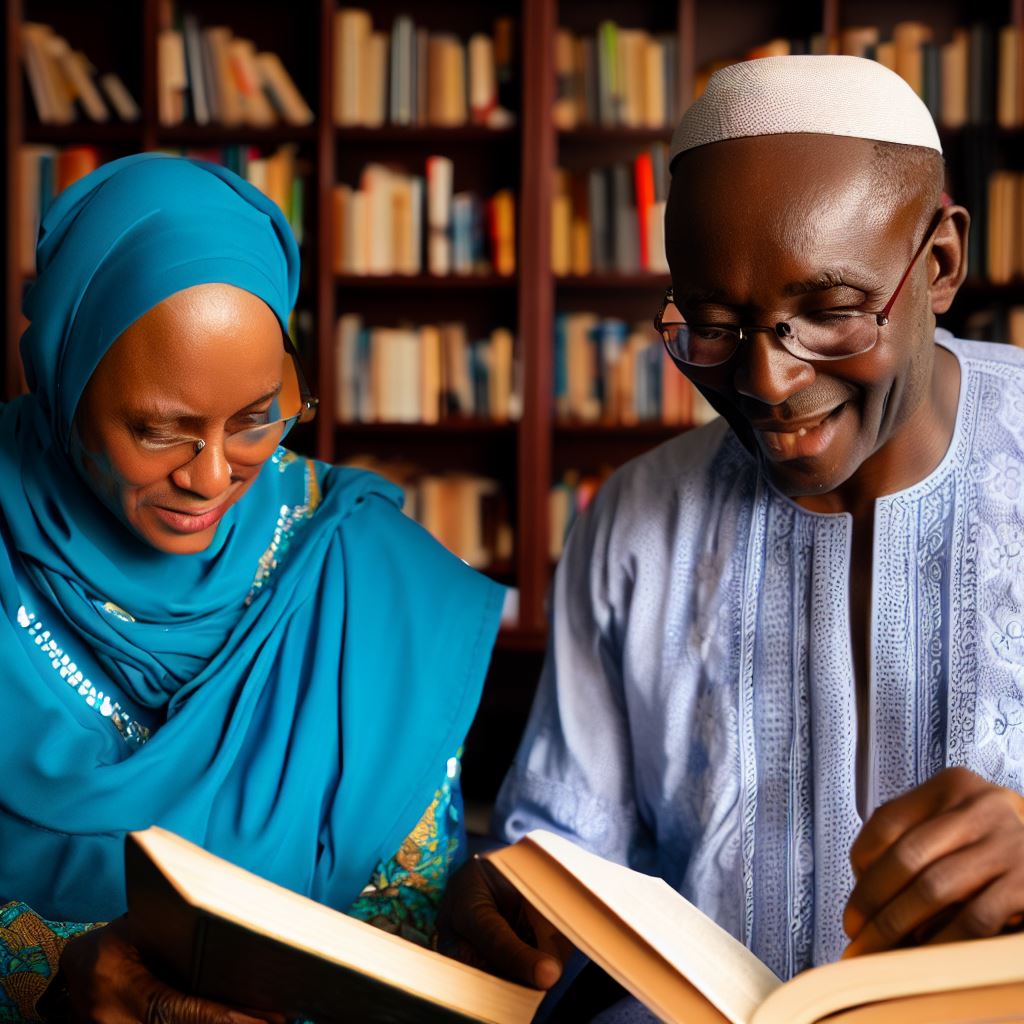Introduction
Librarianship is the profession of managing information resources in libraries, including promoting literacy skills.
Literacy initiatives led by librarians are crucial in promoting education and empowering individuals.
Nigeria’s literacy rates are alarmingly low, with only 59% of the population being literate.
These initiatives play a vital role in improving literacy rates and reducing poverty in Nigeria.
Librarians organize reading programs, provide access to educational materials, and offer literacy training.
They collaborate with schools, government agencies, and community leaders to reach a wider audience.
Librarians encourage the habit of reading, fostering a love for books, and expanding knowledge.
They enhance literacy skills, develop critical thinking, and promote lifelong learning opportunities.
Through these initiatives, librarians bridge the literacy gap and empower individuals to reach their full potential.
Libraries serve as safe havens where individuals can develop their literacy skills and gain knowledge.
By leading literacy initiatives, librarians contribute to the overall development and progress of Nigeria.
Basically, librarians in Nigeria play a crucial role in leading literacy initiatives to enhance education and empower individuals towards a brighter future.
The Role of Librarians in Promoting Literacy
Librarians as information professionals
Librarians play a crucial role in promoting literacy in Nigeria by serving as information professionals.
They are knowledgeable experts who guide individuals in their quest for information.
Librarians are trained to navigate through vast amounts of information, helping users find relevant and reliable sources.
They assist in developing information literacy skills, enabling people to critically evaluate information.
Librarians’ expertise in selecting and curating books
Librarians possess the expertise to select and curate books effectively, catering to different reading levels and interests.
They ensure that the library’s collection is diverse and culturally inclusive.
By carefully curating books, librarians create an environment that fosters a love for reading among individuals of all ages.
They select books that reflect Nigerian culture and history, promoting a sense of identity and preserving local heritage.
Providing access to a wide range of reading materials
Libraries, led by librarians, provide access to a wide range of reading materials, including books, newspapers, magazines, and digital resources.
This variety allows individuals to explore different genres and expand their horizons.
By offering access to a rich collection of reading materials, librarians empower people to discover new interests and knowledge.
They provide resources that cater to diverse learning styles, ensuring inclusivity and equal opportunities for all.
Librarians as mentors and educators
Librarians go beyond their role as holders of information and become mentors and educators in promoting literacy.
They engage with individuals, guiding them through reading activities, and developing essential skills.
Librarians conduct programs such as book clubs, storytelling sessions, and literacy workshops.
These initiatives create a supportive and interactive learning environment, nurturing a passion for reading and enhancing comprehension skills.
Librarians also collaborate with schools and educational institutions, supporting teachers in implementing effective literacy strategies.
They offer guidance on selecting appropriate reading materials and assist in developing curriculum-aligned resources.
Essentially, librarians play a vital role in promoting literacy in Nigeria.
As information professionals, their expertise in selecting and curating books ensures a diverse and inclusive collection for all readers.
By providing access to a wide range of reading materials, they empower individuals to explore new interests and expand knowledge.
Additionally, librarians serve as mentors and educators, conducting programs and collaborating with educational institutions to enhance literacy skills.
Librarians are at the forefront of leading literacy initiatives, making a significant impact on the development and progress of literacy in Nigeria.
Read: Nigeria’s Role in Global Photonics Technology
Challenges to Literacy in Nigeria
Limited access to quality education
- Many regions in Nigeria lack access to quality education, resulting in low literacy rates.
- Limited funding and resources for schools contribute to the inadequate quality of education.
- High student-to-teacher ratios make it difficult for educators to provide individualized attention.
- Insufficient educational facilities and overcrowded classrooms hinder effective teaching and learning.
- Poor infrastructure, such as lack of electricity or internet connectivity, further limits educational opportunities.
Limited infrastructure and resources in rural areas
- Rural communities face significant challenges in terms of access to basic infrastructure for education.
- Lack of schools, libraries, and books in rural areas directly affects literacy levels.
- Inadequate transportation systems make it difficult for children to reach schools located far away.
- Shortage of qualified teachers in rural areas hampers the delivery of quality education.
- Poverty and lack of financial resources impede the establishment of educational facilities in rural communities.
High illiteracy rates among adults
- A large percentage of adults in Nigeria struggle with illiteracy, hindering social and economic development.
- Poverty, limited access to education, and inadequate adult literacy programs contribute to this issue.
- Lack of awareness and understanding of the importance of literacy further perpetuates the problem.
- Adults with low literacy skills face difficulties in finding employment and accessing healthcare services.
- Efforts should be made to provide adult literacy programs and prioritize the education of marginalized groups.
Gender disparity in literacy rates
- Gender inequality remains a significant barrier to literacy in Nigeria.
- Girls often have limited access to education due to cultural norms, early marriage, and domestic responsibilities.
- Discrimination against women and girls in the educational system perpetuates gender disparities in literacy rates.
- Female literacy is crucial for empowering women, improving maternal health, and promoting gender equality.
- Efforts should focus on promoting girls’ education and eliminating gender-based discrimination in schools.
In essence, Nigeria faces various challenges to achieving a high literacy rate.
Limited access to quality education, inadequate infrastructure in rural areas, high illiteracy rates among adults, and gender disparity all contribute to the obstacles faced.
Addressing these challenges requires significant investment in education, improvement in infrastructure, and the promotion of gender equality.
Librarians, as custodians of knowledge, can play a vital role in leading literacy initiatives and collaborating with stakeholders to overcome these challenges and improve literacy rates in Nigeria.
Read: Photonics: A Future-Proof Career in Nigeria?
Successful Literacy Initiatives Led by Nigerian Librarians
Collaboration with schools and local communities
Librarians in Nigeria collaborate with schools and local communities to promote literacy initiatives by organizing book fairs and reading festivals.
Through these collaborations, librarians connect with teachers, students, and parents, fostering a love for reading and improving literacy skills.
Librarians actively engage with schools, creating reading clubs and providing resources and guidance to teachers, ultimately improving reading habits among students.
They also organize community-based programs, such as storytelling and book donation drives, to extend literacy initiatives beyond the school setting.
Mobile libraries bringing books to remote areas
Nigerian librarians have embraced the concept of mobile libraries to reach remote areas where access to books is limited.
These mobile libraries, usually equipped with a wide range of books suitable for different age groups, travel to underserved communities and engage children in reading activities.
By bringing books directly to these areas, librarians ensure that even those living in rural and hard-to-reach places have access to quality reading materials.
The mobile libraries also serve as centers for community engagement, promoting literacy and providing educational resources to the local residents.
Outreach programs and reading campaigns
Librarians in Nigeria actively organize outreach programs and reading campaigns to spread literacy initiatives across the country.
They conduct reading awareness campaigns in schools, encouraging students to develop reading habits and participate in book-related activities.
Librarians, through outreach programs, visit orphanages, hospitals, and prisons, reaching out to marginalized communities and promoting the joy of reading.
These initiatives aim to make reading a cherished activity, inspiring individuals to become lifelong readers and learners.
Use of technology to enhance literacy programs
To adapt to the digital age, Nigerian librarians leverage technology to enhance and expand their literacy programs.
They utilize e-books, online resources, and digital libraries to provide diverse reading materials accessible on various devices.
Librarians also conduct workshops and training sessions to help individuals, particularly teachers, navigate digital platforms, ensuring effective use of technology in education.
By embracing technology, librarians are able to cater to the changing needs and preferences of readers, making literacy initiatives more engaging and accessible.
In a nutshell, Nigerian librarians have been at the forefront of successful literacy initiatives with their collaborative efforts, mobile libraries, outreach programs, and utilization of technology.
These dedicated librarians have played a crucial role in promoting literacy and fostering a culture of reading in various communities across Nigeria.
Through their innovative and inclusive approaches, they have positively impacted the lives of countless individuals, granting them the power of literacy and opening doors to endless possibilities.
Read: Nigeria’s Library Policies: A Librarian’s Perspective

Impact and Benefits of Librarians’ Leadership
Increased literacy rates among children and adults
- Librarians are actively involved in promoting literacy initiatives across Nigeria.
- By organizing reading programs, librarians encourage children and adults to develop their reading skills.
- They assist in selecting appropriate books and materials that cater to various age groups and interests.
- Librarians provide guidance and support to individuals seeking to improve their literacy skills.
- Through their expertise, librarians contribute significantly to the increased literacy rates in Nigeria.
Empowering marginalized communities through education
- Librarians play a crucial role in bridging the educational gap between privileged and marginalized communities.
- They establish libraries in underserved areas, ensuring access to educational resources for all.
- Librarians provide assistance to individuals who lack formal education or face socio-economic challenges.
- By facilitating access to information, librarians empower marginalized communities to overcome barriers and pursue their educational goals.
- The leadership of librarians empowers communities to break the cycle of poverty through education.
Enhancing critical thinking and problem-solving skills
- Librarians organize activities and workshops that promote critical thinking and problem-solving skills.
- They encourage individuals to engage with diverse viewpoints and analyze information critically.
- By guiding users through research processes, librarians help develop effective problem-solving techniques.
- Librarians ensure that individuals have access to resources that foster creativity and analytical thinking.
- The leadership of librarians contributes to the enhancement of critical thinking skills among Nigerians.
Cultivating a reading culture and love for books
- Librarians are instrumental in cultivating a reading culture among children and adults in Nigeria.
- Through book clubs, storytelling sessions, and literary events, librarians inspire a love for books.
- They create engaging and welcoming library environments that encourage people to spend time reading.
- Librarians introduce readers to diverse genres and authors, broadening their literary horizons.
- The leadership of librarians fosters a society that values reading and cherishes the world of books.
In short, librarians’ leadership in literacy initiatives has a profound impact on Nigeria.
Their efforts contribute to the increase in literacy rates among children and adults, empowering marginalized communities through education.
Librarians enhance critical thinking and problem-solving skills while cultivating a reading culture and love for books.
The invaluable role of librarians in promoting literacy and education deserves recognition and support.
Read: Public vs Private Librarian Roles in Nigeria: View
Resources and Support for Librarians Leading Literacy Initiatives
Funding opportunities
- Explore local and international funding options to secure financial support for literacy projects.
- Apply for grants provided by government agencies, NGOs, and philanthropic organizations.
- Research crowdfunding platforms and create compelling campaigns to raise funds for literacy programs.
Professional development programs
- Participate in workshops and trainings focused on enhancing librarians’ literacy leadership skills.
- Join professional networks and associations to access resources and collaborate with fellow librarians.
- Take advantage of online courses and webinars to stay updated with best practices in literacy initiatives.
Government support and partnerships
- Build strong relationships with government officials to advocate for increased support for libraries and literacy.
- Collaborate with educational authorities to align library initiatives with national literacy goals.
- Seek partnerships with government agencies to access resources, funding, and outreach opportunities.
Engaging with international organizations
- Connect with international organizations such as UNESCO and World Literacy Foundation to broaden resources.
- Participate in international conferences and workshops to learn from global literacy experts.
- Collaborate with foreign libraries and organizations to exchange ideas and best practices.
Librarians leading literacy initiatives in Nigeria benefit from resources and support systems:
- Funding: Seek local and international grants, explore crowdfunding, and secure financial support for literacy programs.
- Professional Development: Attend workshops and training programs, join professional networks, access online courses, and webinars for skill enhancement.
- Government Collaboration: Engage with government officials, align initiatives with national literacy goals, and build partnerships for support.
- Global Connections: Utilize international organizations like UNESCO, connect with global experts, attend conferences, and access research and funding.
These resources empower librarians to drive impactful literacy initiatives, ultimately improving literacy rates in Nigeria.
Conclusion
Librarians play a crucial role in literacy initiatives by providing access to books and resources.
Their efforts have had a positive impact through promoting reading culture and empowering individuals.
Continued support and recognition are vital for sustaining and expanding their valuable contributions.




